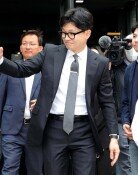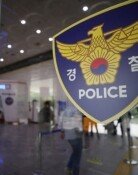Chinas Policy Toward Hong Kong Causes Conflict with the U.S.
Chinas Policy Toward Hong Kong Causes Conflict with the U.S.
Posted April. 04, 2004 22:37,
Chinas plan to reinterpret Hong Kongs Basic law, which guarantees the citys capitalist autonomy for at least 50 years, is eliciting criticism and protests from the opposition parties and civil-society groups in Hong Kong.
Chinese efforts to reinterpret the Basic law also known as the mini-constitution have surfaced seven years after the return of Hong Kong to China by the U.K.
As the Hong Kong government criticized U.S concerns over the issue as an interference with domestic affairs, the Chinese plans would likely offer another point of contention between China and the U.S.
The Standing Committee of National People`s Congress, the top legislature of China, began discussions of the reinterpretation of the constitution on April 2.
There have been intensive discussions on the interpretation of the Basic in Hong Kong, Deputy Director Li Fei of the Commission of Legislative Affairs of the NPC Standing Committee said. The Basic Law should be interpreted correctly for the long-term prosperity and stability of Hong Kong and in the interest of the one country, two systems principle.
The issue of the reinterpretation of the law centers on ways to select the chief executive and members of the Legislative Council after 2007.
The opposition parties and pro-democracy activists demand universal suffrage for the direct election of the legislature and government.
The special economic zone of Hong Kong is part of Chinas administrative institution, and the appointment of its chief executive should not violate its legal limits, an NPC member said, stressing Chinas opposition to Hong Kongs demands.
The issue is then how they will reconcile the principle of one country, two systems with the principle of Hong Kong rules Hong Kong. The NPC is set to announce its decision on April 6.
With the reinterpretation, China appears to attempt to preempt Hong Kongs efforts toward democratization. In July of last year, 500,000 protesters challenged the Hong Kong governments decision to introduce national security legislation. In January of this year, about 100,000 demonstrators demanded the direct election of the chief executive.
China appears to believe that the city state will be out of control if direct elections are allowed. Any democracy in Hong Kong will reduce the principle of one country, two systems, Chinas bedrock reunification policy for Taiwan, into nothing but in name.
About 3,000 Hong Kong residents held a candlelight vigil on April 1 in protest of Chinas moves. The government complex was briefly occupied by student activists. In an open letter to Hong Kongs Chief Executive Tung Chee Hwa, the activists asked, Who demanded that the Chinese government review the Basic law? They said, The new interpretation is in breach of the one country, two system principle and Chinas pledge for Hong Kongs autonomy.
We are seriously concerned that Beijing has decided to pursue an interpretation of the Basic law on this important issue before the Hong Kong people have fully aired the matter," State Department spokesman Adam Ereli said in a statement. Beijing called the U.S. criticism as an interference with Chinas domestic policy.
Yoo-Sung Hwang yshwang@donga.com







